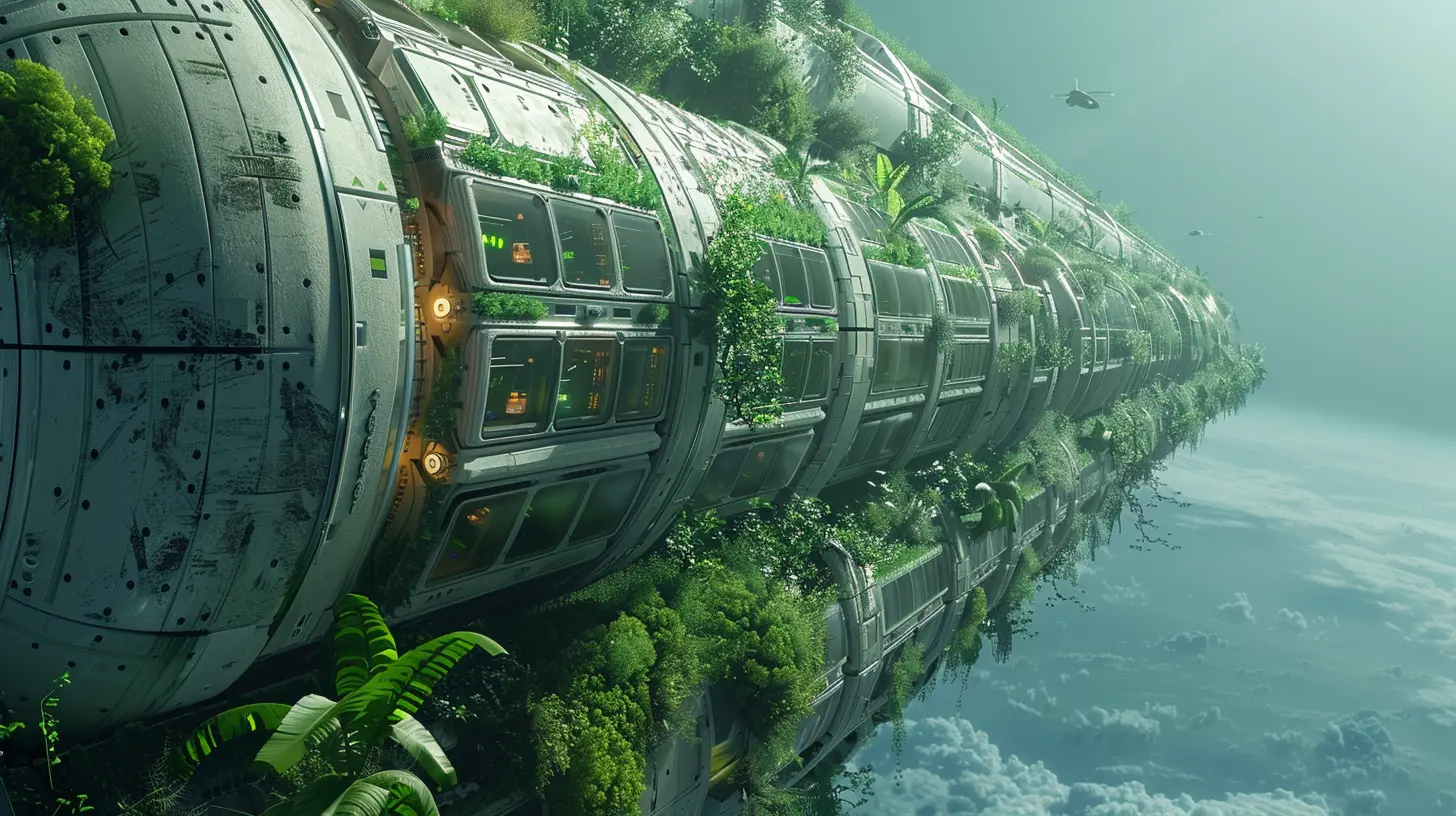Green Technology in Space Exploration: Sustainable Tech for the Final Frontier
8 May 2025
Space exploration has always been about pushing the boundaries of what's possible. From landing on the Moon to sending rovers to Mars, humanity has proven that the sky is not the limit—it's just the beginning. But there's one big problem: space exploration isn't exactly eco-friendly. Rockets guzzle fuel, spacecraft generate waste, and our off-world ambitions leave a cosmic-sized carbon footprint.
So, how do we explore the universe without wrecking it in the process? Enter green technology in space exploration—the game-changing innovations that will take us to the stars while keeping things sustainable. Buckle up, because we're diving into the bold new world of eco-friendly space tech.

Why Sustainability in Space Matters
Before we geek out over the tech, let's tackle the big question: Why does sustainability matter in space?For starters, space missions require an insane amount of energy. Traditional rocket launches rely on fossil fuels, spewing out tons of harmful emissions. Once in space, astronauts rely on resources that are expensive and difficult to transport from Earth. Not to mention, space junk—yes, literal garbage—has become a growing problem, cluttering Earth's orbit with defunct satellites and debris.
If we want to keep exploring the cosmos without turning it into a celestial landfill, we need greener solutions. From renewable energy to waste recycling, space agencies and private companies are going all in on sustainable tech.

Eco-Friendly Propulsion: Fuels That Don’t Wreck the Planet
One of the biggest challenges in space exploration is propulsion. You can't just slap a solar panel on a rocket and call it a day—lifting tons of equipment out of Earth's gravity requires serious power. But traditional rocket fuels come with a cost, both financially and environmentally.1. Ion Propulsion: The Future of Space Travel
Forget old-school chemical rockets—Ion propulsion is where it's at. Instead of burning tons of fuel, ion thrusters use electricity to create a high-velocity stream of ions.🚀 Why it’s awesome:
- Uses way less fuel than chemical rockets
- Generates continuous thrust, making it perfect for deep-space missions
- Reduces harmful emissions
NASA’s Deep Space 1 and the Dawn spacecraft already proved this tech works, and future Mars missions might rely on ion propulsion to glide through space with minimal environmental impact.
2. Green Propellants: Non-Toxic & Efficient
Traditional rocket fuel is packed with hazardous chemicals. Enter green propellants, designed to be safer, more efficient, and environmentally friendly.🚀 Notable advancements:
- The Green Propellant Infusion Mission (GPIM) tested a non-toxic fuel alternative that could replace hydrazine.
- Companies like Rocket Lab and Blue Origin are exploring biofuels and other green alternatives.
These eco-friendly propellants could make future missions safer for astronauts while reducing pollution.

Renewable Energy: Solar Power Beyond Earth
Spacecraft need power, and solar energy is leading the way. While solar panels have been around for decades, modern advancements are making them more efficient and adaptable for interstellar adventures.1. Ultra-Thin Solar Panels: Space's Powerhouses
Imagine lightweight, highly efficient solar panels that can power entire space stations. That’s exactly what scientists are working on.☀️ Why they're game-changers:
- Lighter and more flexible than traditional panels
- Can withstand harsh space conditions
- Provide long-term, renewable energy for deep-space missions
NASA’s Parker Solar Probe and the James Webb Space Telescope use cutting-edge solar tech to stay powered millions of miles from Earth.
2. Space-Based Solar Power: Harvesting Energy Beyond Our Planet
What if we could beam solar power from space back to Earth? It sounds like sci-fi, but researchers are working on satellites that collect solar energy and transmit it wirelessly to power grids on Earth.☀️ How it works:
- Satellites capture sunlight 24/7 (no cloudy days in space!)
- Energy is converted into microwaves or lasers and sent to receiving stations on Earth
- Clean, limitless energy source for our planet
This could revolutionize renewable energy and reduce reliance on fossil fuels.

Sustainability on Space Stations
When astronauts head to space, they can’t just swing by the grocery store or call a plumber. They need to recycle, reuse, and sustain themselves with limited resources.1. Water Recycling: Every Drop Counts
Water is the most precious resource in space. NASA has developed advanced filtration systems that recycle urine, sweat, and humidity into drinkable water. (Yeah, it sounds gross, but it's literally cleaner than what most of us drink on Earth.)💧 Why it matters:
- Reduces the need for resupply missions
- Makes long-term space travel possible
- Provides a blueprint for sustainable Earth-based systems
2. Space Farming: Growing Food Beyond Earth
Astronauts can’t live off freeze-dried food forever. To support long-duration missions, scientists are developing closed-loop farming systems that allow crops to grow in space.🌱 Notable breakthroughs:
- NASA’s Veggie experiment grew lettuce, mustard greens, and radishes on the ISS.
- The Lunar Greenhouse Project is exploring ways to grow food on the Moon and Mars.
Space farming isn’t just about feeding astronauts—it’s a stepping stone for future off-world colonies.
The Fight Against Space Junk
Earth’s orbit is starting to look like a junkyard. Dead satellites, spent rocket parts, and broken debris are whizzing around at 17,500 mph, creating a dangerous situation for future missions.1. Cleanup Missions: Taking Out the Trash
Agencies like ESA and NASA are working on ways to remove space junk using robotic arms, net systems, and even harpoon-like devices (because apparently, hunting debris is a thing now).2. Self-Destructing Satellites
Companies are designing satellites that burn up in the atmosphere after use, preventing them from turning into floating hazards. The goal? A sustainable, clutter-free orbit.
The Future of Green Space Exploration
Sustainability isn’t just a trend—it’s the only way forward if we want to explore space responsibly. With advancements in green propulsion, renewable energy, recycling, and space debris cleanup, we’re proving that exploring the universe doesn’t have to come at the cost of our environment.Private companies like SpaceX, Blue Origin, and Rocket Lab are racing toward eco-friendly space travel, while NASA and ESA continue to lead the charge with groundbreaking sustainability initiatives.
So, will the future of space exploration be green? It has to be. Because if we’re serious about colonizing Mars or beyond, we need to figure out how to do it without trashing the universe in the process.
Final Thought: Earth Is Our First Test
If we can’t figure out sustainability on Earth, how can we manage it in space? The technology we develop for green space exploration could also help solve some of our biggest environmental challenges here at home.The final frontier just got a little greener—and we’re all here for it.
all images in this post were generated using AI tools
Category:
Green TechnologyAuthor:

Michael Robinson
Discussion
rate this article
8 comments
Lucas Vaughn
Great insights on sustainable tech in space exploration! It's crucial for our future to balance innovation with environmental responsibility. Thank you!
May 20, 2025 at 3:32 PM

Michael Robinson
Thank you for your thoughtful comment! I'm glad you found the insights valuable—balancing innovation and environmental responsibility is indeed essential for our future in space exploration.
Meredith McDowney
This article highlights the critical role of green technology in space exploration. By integrating sustainable practices and innovations, we can minimize our environmental impact while pushing the boundaries of discovery. Embracing eco-friendly solutions not only benefits Earth but also paves the way for responsible exploration of the cosmos.
May 19, 2025 at 12:40 PM

Michael Robinson
Thank you for your insightful comment! I completely agree that integrating green technology is essential for responsible and sustainable space exploration. It’s a vital step towards ensuring our discoveries benefit both Earth and the universe.
Owen Hensley
This article insightfully highlights the critical role of green technology in space exploration. By prioritizing sustainability, we can reduce environmental impact and promote resource efficiency, ensuring that our journey into the cosmos aligns with the preservation of our home planet.
May 18, 2025 at 3:08 AM

Michael Robinson
Thank you! I'm glad you found the article insightful. Sustainability is indeed crucial for balancing exploration with environmental responsibility.
Charlie Hernandez
Exciting insights! Sustainable tech shapes space exploration's future!
May 17, 2025 at 4:21 AM

Michael Robinson
Thank you! I'm glad you found the insights exciting—sustainable tech truly is pivotal for the future of space exploration!
Evangeline McFarlin
This article highlights the crucial intersection of sustainability and space exploration. By integrating green technologies, we not only reduce our ecological impact on Earth but also ensure the viability of long-term missions beyond our planet. Innovation in this realm is essential for a responsible and enduring presence in space.
May 15, 2025 at 7:14 PM

Michael Robinson
Thank you for your insightful comment! I completely agree that integrating green technologies is vital for sustainable space exploration and the future of our missions beyond Earth.
Naomi Shaffer
What a fascinating read! Embracing green technology in space exploration not only protects our planet but also paves the way for sustainable innovations beyond Earth. Exciting times ahead!
May 11, 2025 at 8:21 PM

Michael Robinson
Thank you for your insightful comment! I'm glad you found the article engaging. Embracing green technology is indeed crucial for a sustainable future, both on Earth and in space exploration. Exciting times indeed!
Judith Barker
Exploring the cosmos sustainably? It's about time! Green technology in space isn't just innovative; it's essential. Let's ensure our reach doesn't outpace our responsibility to Earth.
May 9, 2025 at 6:57 PM

Michael Robinson
Absolutely! Balancing innovation with responsibility is key to ensuring that our exploration efforts benefit both space and our planet.
Monica Jones
Absolutely inspiring! Embracing green technology in space exploration not only paves the way for sustainable advancements beyond our planet but also sets a powerful example for environmental stewardship on Earth. The future is bright and green!
May 9, 2025 at 11:12 AM

Michael Robinson
Thank you! I completely agree—green technology in space not only enhances our exploration efforts but also inspires sustainable practices here on Earth. The future is indeed bright and green!
MORE POSTS

How Robots Are Enhancing Elderly Care and Independence

How Big Data is Revolutionizing Personalized Medicine

The Intersection of Wearable Devices and Personal Security

Developing Apps for the Internet of Things (IoT): A Guide

How to Create a Winning Esports Team: From Recruitment to Victory

The Growing Popularity of Solar Leasing Programs